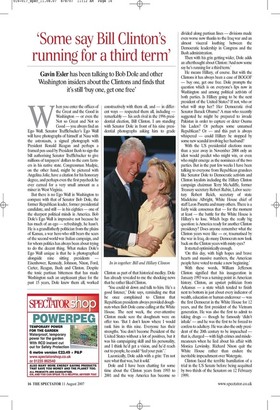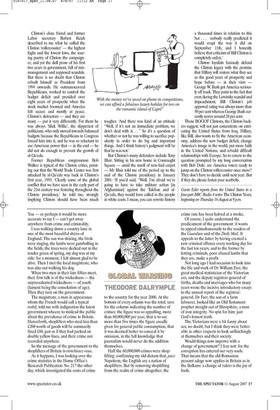'Some say Bill Clinton's running for a third term' Gavin
Esler has been talking to Bob Dole and other Washington insiders about the Clintons and finds that it's still 'buy one, get one free' Ivhen you enter the offices of the Great and the Good in Washington — or even the Not so Great and Not so Good — you always find an Ego Wall. Senator Trufflebacker's Ego Wall will have photographs of himself at Nasa with the astronauts, a signed photograph with President Ronald Reagan and perhaps a framed pen used by President Bush to sign the bill authorising Senator Trufflebacker to give millions of taxpayers' dollars to the corn farmers in his native state. Congressman Mudpie, on the other hand, might be pictured with Angelina Jolie, have a citation for his honorary degree, and perhaps even the first paycheck he ever earned for a very small amount as a miner in West Virginia.
But there is no Ego Wall in Washington to compare with that of Senator Bob Dole, the former Republican leader, former presidential candidate, and still — in his eighties — one of the sharpest political minds in America. Bob Dole's Ego Wall is impressive not because he has much of an ego — refreshingly, he hasn't. He is a grandfatherly politician from the plains of Kansas, a war hero who still bears the scars of the second world war Italian campaign, and for whom politics has always been about trying to do the decent thing. What makes Dole's Ego Wall unique is that he is photographed alongside nine sitting presidents — Eisenhower, Kennedy, Johnson, Nixon, Ford, Carter, Reagan, Bush and Clinton. Despite the toxic partisan bitterness that has made Washington such an unpleasant place for the past 15 years, Dole knew them all, worked constructively with them all, and — in different ways — respected them all, including — remarkably — his arch rival in the 1996 presidential election, Bill Clinton. I am standing with Senator Dole in front of his nine presidential photographs asking him to grade Clinton as part of that historical medley. Dole has already revealed to me the shocking news that he rather liked Clinton.
'You could sit down and talk to him. He's a good listener,' Dole says, reminding me that he once complained to Clinton that Republican presidents always provided doughnuts when Bob Dole came calling at the White House. The next week, the ever-attentive Clinton made sure the doughnuts were on offer too. 'But I don't know where I would rank him in this nine. Everyone has their strengths. You don't become President of the United States without a lot of positives, but it was his campaigning skill and his personality, and I think he'd get a vision, and he'd reach out to people, he could "feel your pain".'
Laconically, Dole adds with a grin: 'I'm not sure what that was, but it sold.'
Dole and I have been chatting for some time about the Clinton years from 1993 to 2001 and the way America has become so divided along partisan lines — divisions made even worse now thanks to the Iraq war and an almost visceral loathing between the Democratic leadership in Congress and the Bush administration.
Then with his grin getting wider, Dole adds an afterthought about Clinton: And now some say he's running for a third term.'
He means Hillary, of course. But with the Clintons it has always been a case of BOGOF — buy one, get one free. Dole prompts the question which is on everyone's lips now in Washington and among political activists of both parties. Is Hillary going to be the next president of the United States? If not, who or what will stop her? Her Democratic rival Senator Barack Obama? A man who recently suggested he might be prepared to invade Pakistan in order to capture or deter Osama bin Laden? Or perhaps some unnamed Republican? Or — and this part is always whispered — could Hillary be stopped by some new scandal involving her husband?
With the US presidential elections more than a year away in November 2008 only an idiot would predict who might win, or even who might emerge as the nominees of the two parties. But in the past few weeks I have been talking to everyone from Republican grandees like Senator Dole to Democratic activists and Clinton loyalists including the Hillary Clinton campaign chairman Terry McAuliffe, former Treasury secretary Robert Rubin, Labor secretary Robert Reich, secretary of state Madeleine Albright, White House chief of staff Leon Panetta and many others. There is a fairly wide consensus that — for the moment at least — the battle for the White House is Hillary's to lose. Which begs the really big question: is America ready for another Clinton presidency? Does anyone remember what the Clinton years were like — or, traumatised by the war in Iraq, do many Democrats now look back on the Clinton years with misty eyes?
It started optimistically enough.
'On this day, with high hopes and brave hearts and massive numbers, the American people have voted to make a new beginning' With these words, William Jefferson Clinton signified that his inauguration in January 1993 was a turning-point in American history. Clinton, an upstart politician from Arkansas — a state which tended to finish next to bottom in just about every indicator of wealth, education or human endeavour — was the first Democrat in the White House for 12 years, and the first president of the Vietnam generation. He was also the first to admit to taking drugs — though he famously 'didn't inhale' — and he was the first to be forced to confess to adultery. He was also the only president of the 20th century to be impeached — that is, charged —with high crimes and misdemeanours when he lied about his affair with Monica Lewinsky. Richard Nixon quit the White House rather than endure the inevitable impeachment over Watergate.
Clinton faced the terrible humiliation of a trial in the US Senate before being acquitted by two thirds of the Senators on 12 February 1999. Clinton's close friend and former Labor secretary Robert Reich described to me what he called the Clinton `rollercoastee — the highest highs and the lowest lows, the soaring poetry of Clinton the campaigner, and yet the dull prose of his first two years in government, full of mismanagement and supposed scandals. But there is no doubt that Clinton rebuilt himself as President from 1994 onwards. He outmanoeuvred Republicans, worked to control the budget deficit and presided over eight years of prosperity when the stock market boomed and America felt secure and mostly at peace. Clinton's detractors — and they are many — put it very differently. For them he was always 'Slick Willie', the slipperiest of politicians, who only moved towards balanced budgets because the Republicans in Congress forced him into it, and he was so reluctant to use American power that — in the end — he did not do enough to prevent the growth of al-Qa'eda.
Former Republican congressman Bob Walker is typical of the Clinton critics, pointing out that the World Trade Center was first attacked by al-Qa'eda way back in Clinton's first year, 1993. 'Clearly some of the global conflict that we have seen in the early part of the 21st century was festering throughout the Clinton presidency,' he told me, strongly implying Clinton should have been much tougher. And there was kind of an attitude "Well, if it's not an immediate problem, we don't deal with it. . . " So it's a question of whether or not he was willing to sacrifice popularity in order to do big and important things And I think history's judgment will be that he was not.'
But Clinton's many defenders include Tony Blair. Sitting in his new home in Connaught Square — amid the smell of new-laid carpet — Mr Blair told me of the period up to the end of the Clinton presidency in January 2001: 'If you'd said, "Well, I'm afraid we're going to have to take military action [in Afghanistan] against the Taleban and alQa'eda, they would have called in the people in white coats. I mean, you can rewrite history a thousand times in relation to this but . . . nobody really predicted it would erupt the way it did on September 11th, and I honestly believe that criticism of Bill Clinton is completely unfair.'
Clinton loyalists furiously defend the Clinton legacy with the promise that Hillary will restore what they see as the good years of prosperity and hope before — in their view — George W. Bush got America seriously off track. They point to the fact that even during the Lewinsky scandal and impeachment, Bill Clinton's job approval rating was always more than 50 per cent whereas George Bush currently scores around 28 per cent Those BOGOF Clintons, the Clinton backers suggest, will not just concentrate on extricating the United States from Iraq Hillary, like Bill, also wants to fix the American economy, address the new budget deficit, change America's image in the world, put more faith in the United Nations, and rebuild difficult relationships with Europe. So to return to the question prompted by my long conversation with Bob Dole: are America voters ready to jump on the Clinton rollercoaster once more? They don't have to decide until next year. But if they do, please fasten your seatbelts.
Gavin Esler reports from the United States in a four-part BBC Radio 4 series The Clinton Years beginning on Thursday 16 August at 9 p.m.










































 Previous page
Previous page